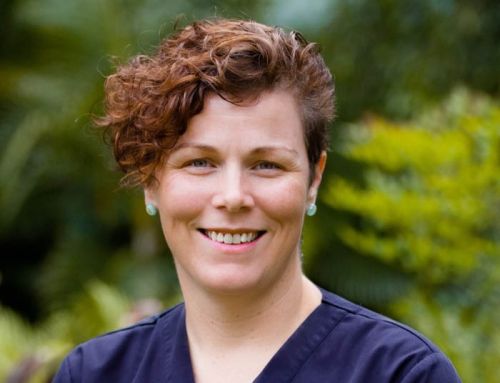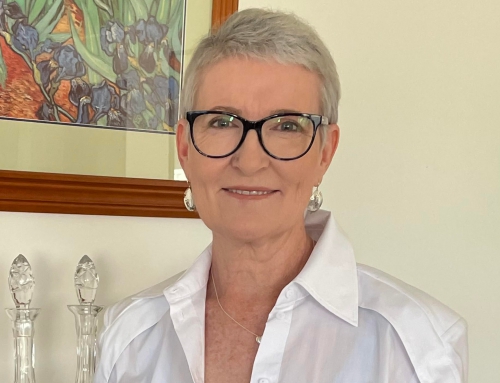In light of International Nurses Day 2022, ANZGOG interviews oncology clinical nurse specialist and ANZGOG project officer, Danielle Osmond, who demonstrates the influential and pivotal role that nurses play in gynaecological cancer research, often going above and beyond to meet patient and services needs.

What does a gynaecologic cancer nurse do?
Gynaecological cancer nurses are nurses with expertise in caring for patients with gynaecological cancers. This involves the nurse having a thorough understanding of gynaecological cancers and the impact it has on patients and their families through all phases of the disease. Gynaecological cancer nurses provide patient centred care specific to the needs of a patient with a gynaecological cancer, including supporting and advocating for the physical, emotional, spiritual, social, psychological, psychosocial, and psychosexual needs of the patient throughout their cancer journey. Gynaecological cancer nurses provide education about health promotion and screening practices, as well as assessment, guidance and counselling of symptom management and management of treatment related toxicities; act as a point of contact for the patient and their family, providing communication to the patient and their family, as well as other members of the multidisciplinary team; care-coordination, including safe administration of cancer treatments and assessing for complications of therapy; assessing the patients’ needs and providing support and management, including making necessary referrals.
“Gynaecological cancer nurses provide patient centred care specific to the needs of a patient.”
Why are gynaecologic cancer nurse’s integral in the treatment of patients with gynaecological cancer?
Gynaecological cancer nurses are integral to the multidisciplinary approach in treating a patient with a gynaecological cancer, playing a key role in understanding and meeting the needs of a patient with gynaecological cancer. Patients and their families need specialist nurses to guide and support them on their cancer journey, along the treatment trajectory and into survivorship; nurses provide a source of knowledge and support, developing trusting relationships with the patient and their families, and are key in communicating information to the patient, their families and members of the multidisciplinary team. It is through the development of the trusting relationships gynaecological cancer nurses have with their patients and their families, that patients often express feeling reassured and supported so that their individual needs are being listened to and met. Patients often express that they feel more comfortable talking to their nurse about the treatment options their doctor has discussed with them, including any available clinical trials. Nurses often interpret, translate and explain the options to the patient and their carer whilst supporting them in making their treatment decision according to the patients personal goals; discussing the symptoms, treatment toxicities, as well as discussing the patients feelings, and so rely on the nurses being accessible and knowledgeable to provide this support and advocate for the patient to ensure all members of the multidisciplinary team are aware of the patients individual needs and concerns.
What are some of the challenges you’ve seen from patients receiving treatment?
Some of the challenges I have seen from patient’s receiving treatment include the impact the treatment can have on the patient’s quality of life and their family members. Many patients are having to try and balance their treatment needs with their work and home responsibilities, and many patients need to travel long distances to access treatments that are only available in metropolitan areas, which can increase the burden on the patient as well as their family. The need for care planning to involve enhanced and timely communication with a patient’s local service provider, including GPs, local hospitals and community-based services to ensure the patient has support within her own community, will optimise the patient care pathway and ensure timely access to services, avoiding unnecessary delays in diagnosis and management of patient’s symptoms and toxicities.
“Some of the challenges I have seen from patient’s receiving treatment includes the impact the treatment can have on the patient’s quality of life and their family members.”
Gynaecological cancers and their treatment affect sexual and reproductive organs which can cause sudden, severe and prolonged symptoms, including menopausal issues, pain management, lymphoedema, continence issues, as well as infertility, all of which can negatively impact a patient’s quality of life. This often leads to emotional distress, and disruption of social and intimate relationships, which may cause low self-esteem and a loss of femininity. It is therefore necessary for all patients with gynaecological cancers to have access to specialist services closer to home to ensure all the patient’s supportive care needs are met.
How are gynaecologic cancer nurses different from other nurses?
While there are many similarities in the needs of gynaecological cancer patients’ and patients with other cancers, the needs of a patient with a gynaecological cancer are complex and can change over the course of their cancer journey. The impact on the patient’s reproductive and sexual organs can make them particularly vulnerable both during and following treatment, with some of the symptoms and toxicities experienced causing premature menopause, hot flashes, vaginal dryness, and sexual dysfunction; these can impact the patient’s sense of self and patients may find these issues difficult or uncomfortable conversations to have. A sensitive and holistic approach to caring for these patients is essential, with attention paid to the cultural, ethical, and spiritual preferences of the patient will ensure all the supportive care needs are going to be identified and met. It is essential the patient is comfortable having these conversations in a safe physical, emotional and cultural environment as this will optimize the quality of life and outcome of the patient.
Can you explain some important moments you’ve experienced as a gynaecologic cancer nurse?
“..patients and their caregivers were able to phone me directly to discuss their concerns, whether it was regarding treatment-related toxicities, disease symptom management, or other concerns or supportive care needs. “
There have been many important moments that I have experienced as a cancer nurse caring for patients with gynaecological cancer, many of which have involved being present in the moment to support the patient, listening to the patient’s individual needs, and advocating for the patient. As a clinical nurse specialist in oncology clinical trials, patients and their caregivers were able to phone me directly to discuss their concerns, whether it was regarding treatment-related toxicities, disease symptom management, or other concerns or supportive care needs. I felt it was very important that I was accessible and available to the patient or her carer when they needed support and that I provided timely counselling and education to the patient on how to manage the symptoms and toxicities she was experiencing, providing the necessary resources or referring the patient onto other members of the multidisciplinary team. I felt it was important to sit with the patient during her consultations with the doctor as she received results or discussed changes in treatment plans, so I could provide the emotional support that was needed. Patients often come out of the consultation room and would be processing the results or the discussion that was had and needed to talk about it further or have the information they were given explained again. Knowing I was able to provide that support, counselling and reassurance was a very important and meaningful part of my role.
There was one occasion a patient had told me she did not wish to continue treatment as the toxicities were impacting her quality of life, she didn’t discuss this with her doctor, or feel confident in expressing these concerns. The patient trusted me and knew that I would advocate for her, and so felt comfortable having this conversation with me. I informed the doctor of the patient’s concerns and wishes, which led to the lengthy discussions between the doctor and the patient, to ensure we were respecting the patient’s wishes, and providing her with all the information she needed to make an informed decision which she was supported in, and that all the necessary supportive care measures could be put in place. This is just one example of how important it was for me that I built trusting relationships with my patients, to ensure the patient felt comfortable they were able to have these conversations and that their individual needs would be listened to.
Want to learn more about gynaecological cancer research?
To find out more about ANZGOG’s, click here.











